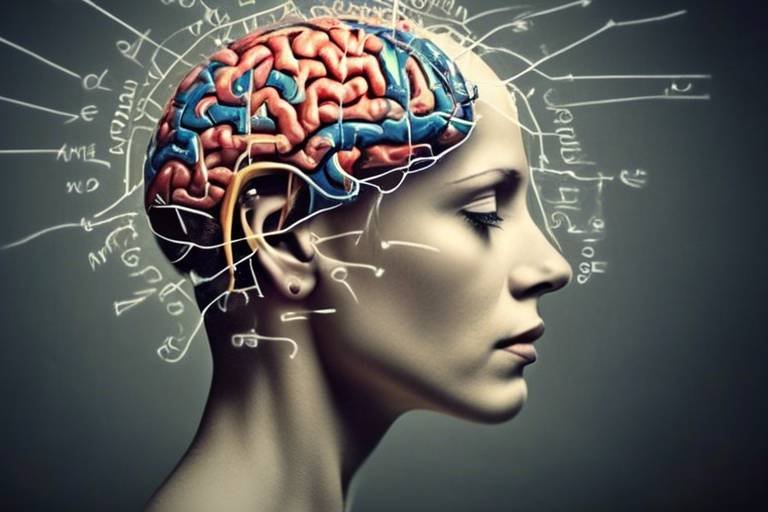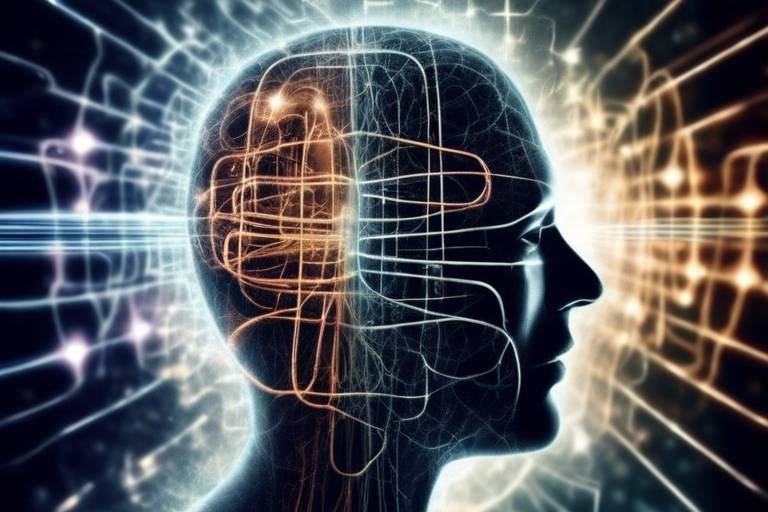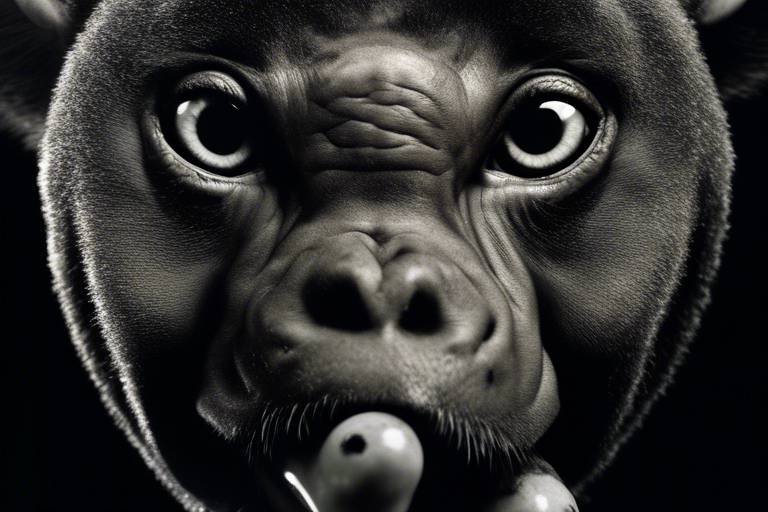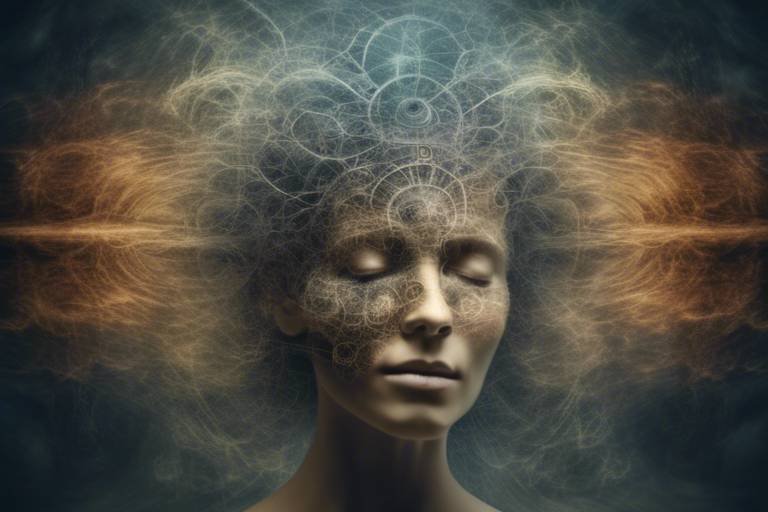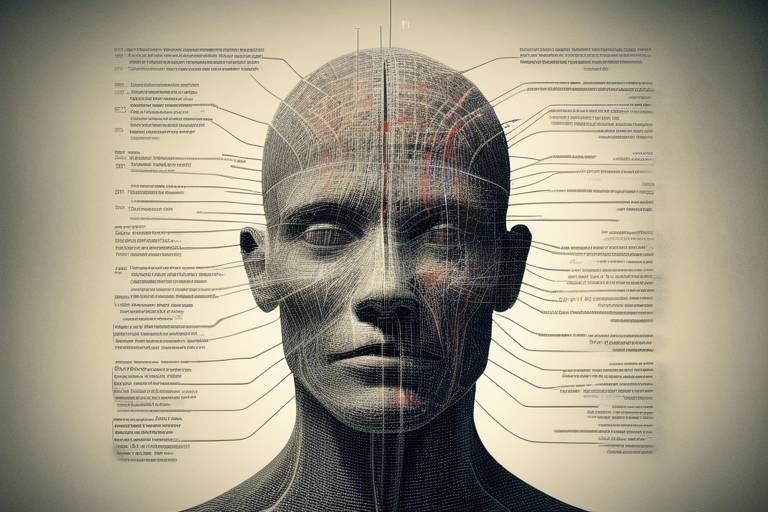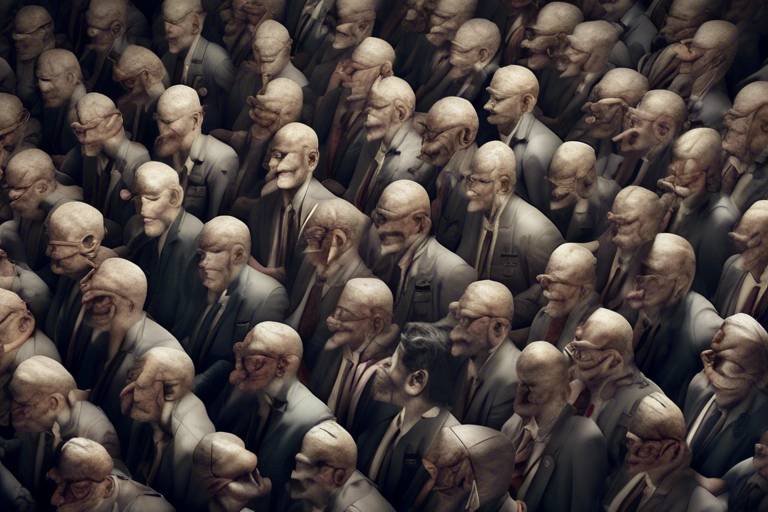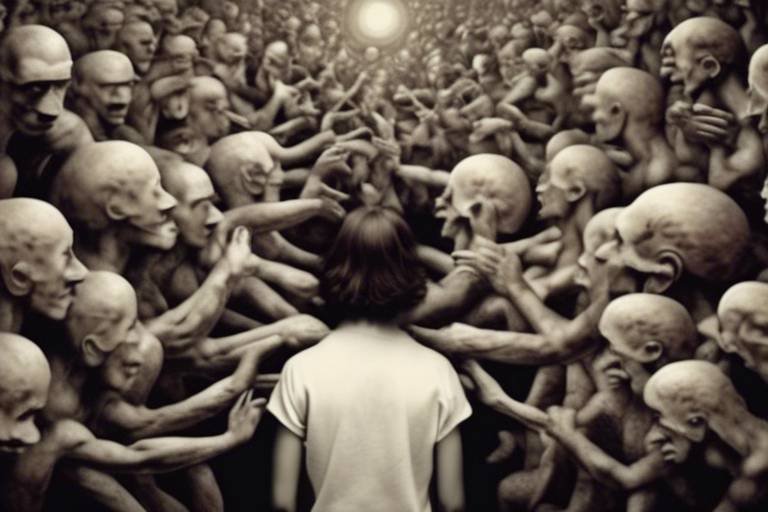Does Consciousness Depend on the Functioning of the Brain?
The relationship between consciousness and the brain has long been a topic of fascination and debate among scientists, philosophers, and curious minds alike. At its core, consciousness is our awareness of ourselves and the world around us. But the question remains: does it solely depend on the functioning of the brain? To answer this, we must dive deep into the nature of consciousness itself, explore the intricate workings of the brain, and examine various perspectives that challenge or support this connection.
Imagine consciousness as a vast ocean, with the brain serving as the vessel navigating its depths. Some argue that without the vessel, the ocean remains uncharted and inaccessible. In contrast, others believe that the ocean exists independently, regardless of whether a vessel is present. This metaphor captures the essence of the debate: is consciousness merely a product of neural activity, or does it have an existence beyond the physical realm?
To unravel this complex relationship, we must first understand the nature of consciousness. It's not just about being awake or aware; it encompasses thoughts, feelings, perceptions, and the subjective experience of existence. Philosophers have pondered the essence of consciousness for centuries, asking questions like, "What does it mean to be conscious?" and "Is consciousness a fundamental aspect of the universe?" These inquiries set the stage for a deeper exploration of how the brain plays a role in shaping our conscious experiences.
The brain is undoubtedly a critical player in the theater of consciousness. Neuroscientific research has shown that specific brain activities correlate with different conscious experiences. For instance, when we engage in problem-solving, certain areas of the brain light up, suggesting a direct link between neural activity and our awareness of cognitive processes. But does this mean that consciousness is entirely dependent on the brain's functioning?
To explore this further, we can look at various neuroscientific perspectives. Brain imaging technologies, such as fMRI and PET scans, allow researchers to observe real-time brain activity. These studies often reveal fascinating insights into how different brain regions contribute to our conscious experiences. However, they also raise questions about the nature of consciousness itself. If consciousness arises from the brain's functioning, what happens in cases of brain injuries or disorders that affect consciousness?
A compelling way to investigate this is through case studies of brain injuries. For example, individuals with damage to specific areas of the brain may lose certain aspects of consciousness, such as self-awareness or the ability to recognize familiar faces. These cases provide crucial information about the link between brain function and consciousness, suggesting that while the brain plays a significant role, consciousness may not be entirely reliant on it.
Another fascinating aspect to consider is neuroplasticity—the brain's ability to reorganize itself. This phenomenon suggests that even if certain brain areas are damaged, other regions may compensate, potentially altering conscious experiences. This adaptability raises further questions: if consciousness can shift based on changes in the brain, what does that imply about its nature?
As we delve into the philosophical perspectives surrounding consciousness, we encounter various viewpoints, including dualism, which posits that the mind and body are separate entities, and physicalism, which argues that everything about consciousness can be explained through physical processes. Then there's panpsychism, which suggests that consciousness is a fundamental quality of all matter. Each of these perspectives offers a unique lens through which we can examine the brain's role in conscious experience, enriching our understanding of this enigmatic phenomenon.
In conclusion, the relationship between consciousness and brain function is intricate and multifaceted. While the brain undoubtedly plays a crucial role in shaping our conscious experiences, the extent to which consciousness relies on neural activity remains a topic of ongoing exploration. As we continue to investigate this profound question, we may uncover new insights that challenge our understanding of what it means to be conscious.
- What is consciousness? Consciousness refers to our awareness of ourselves and our environment, encompassing thoughts, feelings, and perceptions.
- Is consciousness solely a product of brain activity? While brain activity is closely linked to consciousness, the debate continues regarding whether consciousness exists independently of the brain.
- How do brain injuries affect consciousness? Brain injuries can lead to significant changes in consciousness, such as loss of self-awareness or the inability to recognize familiar faces, indicating a strong connection between brain function and conscious experience.
- What is neuroplasticity? Neuroplasticity is the brain's ability to reorganize itself, which can influence consciousness and subjective experiences.
- What are the philosophical perspectives on consciousness? Key perspectives include dualism, physicalism, and panpsychism, each offering different insights into the nature of consciousness and its relationship with the brain.

The Nature of Consciousness
Understanding what consciousness truly is forms the foundation of this discussion, delving into its definitions, characteristics, and the philosophical questions surrounding its existence and essence. At its core, consciousness can be described as the state of being aware of and able to think about one's own existence, thoughts, and surroundings. It’s that inner voice we all have, the one that narrates our experiences and reflects on our feelings. But how do we define something so deeply personal and yet so universally experienced?
Philosophers and scientists alike have grappled with the concept of consciousness for centuries, leading to a myriad of definitions and theories. Some argue that consciousness is merely a byproduct of complex brain processes, while others propose that it might be an intrinsic quality of the universe itself. This divergence in thought raises intriguing questions: Is consciousness simply the result of neural activity, or does it exist independently of the physical brain?
The characteristics of consciousness are equally fascinating. It encompasses a range of experiences, from simple sensory perceptions to profound self-reflection. For instance, when you listen to your favorite song, you not only hear the music but also feel emotions that may transport you back to a specific memory. This ability to connect experiences, emotions, and thoughts is a hallmark of conscious awareness. Moreover, consciousness is not static; it can fluctuate based on various factors, including sleep, attention, and even the substances we consume.
To further complicate our understanding, consciousness is often categorized into different levels or states. These can include:
- Wakefulness: The most common state, where we are fully alert and aware of our surroundings.
- Dreaming: A unique state of consciousness that occurs during sleep, characterized by vivid imagery and emotions.
- Meditative States: Altered states achieved through practices like meditation, often leading to heightened self-awareness and tranquility.
- Altered States: Induced by substances or extreme experiences, these states can significantly shift perception and awareness.
Each of these states offers a different lens through which to explore consciousness. The transitions between them can be subtle or drastic, and they often prompt us to question the very nature of our reality. What does it mean to be conscious? Are we more than just our thoughts and perceptions? These questions echo through the halls of philosophy and science, inviting continuous exploration.
As we delve deeper into the nature of consciousness, it’s essential to consider its implications on our understanding of identity, morality, and existence itself. If consciousness is merely a product of brain activity, how does that affect our notions of free will and personal responsibility? Conversely, if consciousness exists independently, what does that mean for our understanding of life and the universe? These profound inquiries not only challenge our current paradigms but also inspire us to seek answers that may forever change the way we perceive ourselves and our place in the cosmos.
In summary, the nature of consciousness is a complex tapestry woven from threads of awareness, experience, and philosophical inquiry. As we continue to explore this enigmatic phenomenon, we may unlock new dimensions of understanding that bridge the gap between the mind and the brain, ultimately enriching our grasp of what it means to be conscious.

The Brain's Role in Consciousness
When we dive into the question of consciousness, it’s impossible to ignore the pivotal role that the brain plays in shaping our experiences and perceptions. Imagine your brain as a complex orchestra, where every neuron is a musician, and each thought, feeling, or sensation is a symphony being performed. This intricate interplay of neural activity forms the basis of our conscious experience. But what exactly does this mean? Simply put, our consciousness appears to be deeply intertwined with the functioning of our brain, suggesting that the brain is not just a passive vessel but an active participant in the creation of our awareness.
Research has shown that different areas of the brain are responsible for various aspects of consciousness. For instance, the prefrontal cortex is crucial for decision-making and self-awareness, while the thalamus acts as a relay station for sensory information, helping us make sense of the world around us. These regions work together, forming a network that allows us to experience reality in a cohesive manner. Without the proper functioning of these brain areas, our conscious experiences can become fragmented or even non-existent.
To further illustrate this point, consider the following table that summarizes key brain regions and their associated functions in relation to consciousness:
| Brain Region | Function |
|---|---|
| Prefrontal Cortex | Decision-making, self-awareness, and planning |
| Thalamus | Sensory information relay, awareness of stimuli |
| Hippocampus | Memory formation and retrieval |
| Parietal Lobe | Spatial awareness and perception of touch |
Moreover, the relationship between brain activity and consciousness is not merely a one-way street. Our conscious experiences can also influence brain function. For example, when we engage in mindfulness practices, we can actually change the way our brain operates. This fascinating concept leads us to consider the phenomenon of neuroplasticity, which refers to the brain's ability to reorganize itself by forming new neural connections throughout life. It raises the question: can our conscious choices shape our brain's structure and, consequently, our consciousness?
As we explore the complexities of consciousness, it’s essential to acknowledge the contributions of neuroscience. Techniques such as functional MRI (fMRI) and electroencephalography (EEG) have provided invaluable insights into how brain activity correlates with conscious experience. These technologies allow researchers to observe the brain in action, revealing patterns of activity that correspond to specific thoughts or sensations. For instance, studies have shown that certain patterns of brain activity are associated with feelings of happiness, sadness, or even heightened awareness during meditative states.
In conclusion, while the brain plays a crucial role in shaping our consciousness, the relationship is dynamic and multifaceted. It’s a dance of neurons and synapses, where both brain function and conscious experience influence one another. As we continue to unravel the mysteries of consciousness, it becomes increasingly clear that understanding the brain is essential for grasping the essence of what it means to be aware.
- What is consciousness? Consciousness is the state of being aware of and able to think about one's own existence, thoughts, and surroundings.
- Can consciousness exist without the brain? This is a topic of ongoing debate; some theories suggest that consciousness is a product of brain activity, while others propose that it may exist independently.
- How does brain injury affect consciousness? Brain injuries can lead to alterations in consciousness, ranging from mild disruptions to complete loss of awareness, depending on the area of the brain affected.
- What is neuroplasticity? Neuroplasticity is the brain's ability to reorganize itself by forming new neural connections, which can influence consciousness and cognitive functions.

Neuroscientific Perspectives
When we dive into the realm of neuroscience, we unearth a treasure trove of insights that illuminate the intricate relationship between brain function and consciousness. Neuroscientific research has provided compelling evidence that suggests our conscious experiences are deeply intertwined with neural processes. But how exactly does this connection manifest? To unravel this mystery, scientists have employed various methods, including brain imaging techniques like fMRI (functional Magnetic Resonance Imaging) and PET (Positron Emission Tomography), which allow researchers to observe brain activity in real-time.
These imaging technologies have revealed that specific regions of the brain light up during different conscious experiences. For instance, when we engage in complex problem-solving or creative thinking, the prefrontal cortex becomes particularly active. This correlation raises fascinating questions: Is consciousness merely a byproduct of these neural activities, or does it play a more active role in shaping our thoughts and actions? As we explore these questions, it’s crucial to consider how brain injuries and disorders can further inform our understanding of consciousness.
Case studies of individuals who have suffered brain injuries provide stark examples of how consciousness can be affected by alterations in brain function. Take the case of Phineas Gage, a railroad construction foreman who survived a severe brain injury in the 19th century. After an iron rod pierced his skull, Gage's personality underwent a dramatic transformation; he became impulsive and irresponsible, suggesting that specific areas of the brain are crucial for maintaining aspects of consciousness such as self-control and social behavior. This case, along with others, underscores the idea that our consciousness is not just a vague, ethereal quality but is grounded in the physical structure and functioning of the brain.
Moreover, the concept of neuroplasticity—our brain's remarkable ability to reorganize itself—adds another layer of complexity to the conversation about consciousness. Neuroplasticity suggests that even after injury or trauma, the brain can adapt and form new neural connections, which can lead to changes in conscious experience. For example, individuals who have experienced strokes may regain lost functions through rehabilitation, demonstrating that consciousness is not a static entity but rather a dynamic interplay between brain activity and personal experience. This adaptability raises intriguing questions about the potential for enhancing consciousness through targeted interventions and therapies.
In summary, neuroscientific perspectives provide a compelling framework for understanding consciousness. The interplay between brain activity, injuries, and the brain’s ability to adapt not only shapes our conscious experiences but also challenges our understanding of what it means to be aware. As we continue to explore the depths of neuroscience, we may uncover even more profound connections between the brain and the essence of consciousness itself.
- What is consciousness? Consciousness refers to our awareness of ourselves and our environment, encompassing thoughts, feelings, and perceptions.
- How does brain injury affect consciousness? Brain injuries can disrupt normal brain function, leading to changes in personality, awareness, and cognitive abilities.
- What role does neuroplasticity play in consciousness? Neuroplasticity allows the brain to adapt and reorganize itself, which can influence conscious experiences and recovery from injuries.
- Can consciousness exist without brain function? This remains a subject of debate; some theories suggest consciousness is dependent on the brain, while others propose it may exist independently.

Case Studies of Brain Injuries
When we dive into the realm of brain injuries, we uncover fascinating insights that illuminate the intricate relationship between brain function and consciousness. One of the most compelling aspects of studying brain injuries is how they can dramatically alter a person's conscious experience, revealing the underlying mechanisms of awareness. For instance, consider the case of Phineas Gage, a railroad construction foreman who survived a severe brain injury in 1848 when a large iron rod accidentally pierced his skull. Remarkably, Gage lived for many years after the accident, but his personality underwent a radical transformation. Once a responsible and friendly individual, he became impulsive, irresponsible, and socially inappropriate. This case highlights how specific areas of the brain, particularly the frontal lobes, play a crucial role in personality and social behavior, suggesting that our consciousness is deeply intertwined with the physical state of our brains.
Another poignant example is the case of patients with locked-in syndrome, a condition where individuals are fully conscious and aware but unable to move or communicate verbally due to complete paralysis of nearly all voluntary muscles. These patients often retain cognitive function, yet their inability to express themselves raises profound questions about the nature of consciousness. Are they truly aware of their surroundings, or is their consciousness trapped within a non-functioning body? Such cases challenge our understanding of consciousness, suggesting that it may not solely depend on physical movement or verbal expression.
Furthermore, we can look at individuals who have experienced traumatic brain injuries (TBIs) resulting from accidents or sports. These injuries can lead to a range of outcomes, from mild concussions that cause temporary confusion to severe damage that results in prolonged unconsciousness or a vegetative state. Studies of these patients have shown that even when a person appears unresponsive, there may still be some level of consciousness present, as evidenced by advanced imaging techniques that reveal brain activity in response to external stimuli. This phenomenon raises the question: how do we define consciousness, and what does it mean to be aware?
To summarize the insights gained from these case studies, we can categorize the effects of brain injuries on consciousness into several key points:
- Personality Changes: Injuries to specific brain regions can lead to significant alterations in personality and behavior, indicating a direct link between brain function and conscious experience.
- Locked-in Syndrome: This condition exemplifies the complexity of consciousness, showing that awareness can exist independently of physical expression.
- Traumatic Brain Injuries: The spectrum of outcomes from TBIs highlights the variability in conscious experience and the challenges in measuring it.
These case studies not only provide valuable data for neuroscientists but also evoke deep philosophical questions about the essence of consciousness. Are we merely the sum of our neural connections, or is there something more profound at play? As we continue to explore the connections between brain injuries and consciousness, we inch closer to unraveling the mysteries of the mind.

Neuroplasticity and Consciousness
Neuroplasticity, often referred to as the brain's remarkable ability to reorganize itself by forming new neural connections throughout life, plays a pivotal role in our understanding of consciousness. Imagine your brain as a bustling city, where the roads represent neural pathways. When a new road is built, or an old one is repaired, it can change how traffic flows—just like how neuroplasticity can alter our conscious experiences. This adaptability raises fascinating questions about the nature of consciousness itself: Is it a fixed state, or can it evolve based on our experiences and environment?
Research into neuroplasticity has demonstrated that various factors, such as learning, experience, and even injury, can reshape our brain's architecture. For instance, when someone learns a new skill, their brain physically changes, creating new pathways that enhance their ability to perform that skill. This phenomenon suggests that consciousness is not merely a byproduct of static brain functions but is instead dynamic and influenced by our interactions with the world around us.
One compelling aspect of neuroplasticity is its potential impact on recovery from brain injuries. After sustaining damage, the brain can often compensate for lost functions by reorganizing itself. For example, if one area of the brain responsible for certain tasks is injured, other areas may adapt to take over those functions. This adaptability not only highlights the resilience of the brain but also suggests that consciousness can be altered based on the brain's structural changes. In essence, our conscious experience may shift as our neural pathways evolve.
Moreover, studies have shown that neuroplasticity can be influenced by practices such as meditation and mindfulness. These practices encourage individuals to focus on their thoughts and feelings, leading to changes in brain structure and function. Research indicates that regular meditation can increase the thickness of the prefrontal cortex, an area associated with higher-order functions like decision-making and self-awareness. This enhancement of brain function could lead to a deeper or altered state of consciousness, challenging the traditional view that consciousness is solely dependent on specific neural activities.
In summary, neuroplasticity offers a fascinating lens through which to examine consciousness. The brain's ability to adapt, learn, and reorganize suggests that our conscious experiences are not fixed but can evolve over time. As we continue to explore this relationship, we may uncover new insights into how our thoughts, emotions, and experiences shape the very essence of what it means to be conscious.
- What is neuroplasticity? Neuroplasticity is the brain's ability to reorganize itself by forming new neural connections throughout life, allowing for changes in behavior, learning, and recovery from injuries.
- How does neuroplasticity relate to consciousness? Neuroplasticity suggests that consciousness is not a static state but can change based on experiences and brain adaptations.
- Can meditation influence neuroplasticity? Yes, practices like meditation have been shown to enhance neuroplasticity, leading to structural changes in the brain that can alter conscious experiences.
- What role does brain injury play in neuroplasticity? After a brain injury, neuroplasticity allows other areas of the brain to compensate for lost functions, potentially altering the individual's conscious experience.

Philosophical Perspectives
The exploration of consciousness has long been a captivating journey for philosophers, scientists, and curious minds alike. At its core, the question of whether consciousness is a product of the brain or something more transcendent invites a myriad of philosophical perspectives. Each theory offers a unique lens through which to view the intricate relationship between our mental experiences and the physical workings of the brain. Let's delve into some of the most prominent philosophical viewpoints that have emerged over the years.
One of the most well-known theories is dualism, famously championed by René Descartes. Dualists argue that consciousness exists independently of the physical body, suggesting that the mind and brain are two distinct entities. This perspective raises intriguing questions: If the mind can exist apart from the brain, what does that mean for our understanding of life after death? Can consciousness exist in a non-physical realm? While dualism provides a compelling narrative, it struggles to explain how two such different substances could interact. This is often referred to as the "interaction problem," leaving many to ponder the true nature of reality.
In contrast, physicalism posits that everything about consciousness can be explained through physical processes. According to this view, our thoughts, feelings, and experiences are merely the byproducts of neural activity. Physicalists argue that as we deepen our understanding of the brain, we will eventually unravel all the mysteries of consciousness. This perspective aligns with the scientific method, emphasizing the importance of empirical evidence. However, critics of physicalism often highlight the “hard problem of consciousness”, which questions why and how subjective experiences arise from mere physical interactions. Can neurons firing truly account for the richness of human experience?
Another intriguing perspective is panpsychism, which suggests that consciousness is a fundamental feature of the universe, present even in the simplest forms of matter. According to panpsychists, everything has some degree of consciousness, from a grain of sand to the vast cosmos. This view challenges our anthropocentric understanding of consciousness and invites us to consider the possibility that awareness is not exclusive to humans. Imagine a world where the rocks beneath our feet possess a form of consciousness, however rudimentary! This perspective opens up new avenues for understanding the interconnectedness of all things.
As we navigate these philosophical waters, it becomes clear that each perspective offers valuable insights, yet none can fully encapsulate the complexity of consciousness. The debate continues as we seek to understand not only the mechanics of the brain but also the essence of our subjective experiences. The intersection of philosophy and neuroscience presents a rich tapestry of ideas, inviting further exploration and dialogue.
In summary, the philosophical perspectives on consciousness—dualism, physicalism, and panpsychism—each provide unique insights into the age-old question of what it means to be conscious. As we continue to unravel the mysteries of the mind, these theories will undoubtedly evolve, challenging us to reconsider our assumptions about the nature of reality.
- What is dualism? Dualism is the philosophical view that the mind and body are separate entities, suggesting that consciousness exists independently of physical processes.
- What is physicalism? Physicalism posits that everything about consciousness can be explained through physical processes and that mental states are ultimately reducible to brain activity.
- What is panpsychism? Panpsychism is the theory that consciousness is a fundamental feature of the universe, present in all matter, not just in humans or complex organisms.
- How do these perspectives influence consciousness research? Each perspective shapes the questions researchers ask and the methods they use to study consciousness, influencing both philosophical discourse and scientific inquiry.

Altered States of Consciousness
When we think about consciousness, we often picture a steady stream of thoughts and perceptions, much like a calm river flowing through our minds. However, there are moments when this river can swell, twist, and even transform into something entirely different. These moments are known as , and they can occur due to a variety of factors, including dreams, meditation, and the use of psychoactive substances. Each of these states not only challenges our traditional understanding of consciousness but also raises intriguing questions about the relationship between consciousness and the brain.
Let’s dive into the fascinating world of altered states and explore how they can reshape our perception of reality. For instance, during dreaming, our brains create vivid scenarios that often feel as real as our waking life. In fact, studies have shown that brain activity during REM sleep—when most dreaming occurs—resembles that of being awake. This raises the question: if our brain is so active during dreams, is our consciousness still tied to our brain's functioning, or does it exist in a realm beyond?
Then we have meditation, a practice that many turn to for relaxation and self-discovery. Research indicates that meditation can significantly alter brain function, leading to changes in areas responsible for self-awareness and emotional regulation. These changes can enhance our ability to focus and foster a deeper connection to our thoughts and feelings. It’s almost like tuning a radio to pick up a clearer signal; the more we practice, the more we can refine our consciousness and experience a heightened sense of awareness.
On the other end of the spectrum, we find the use of hallucinogens. Substances like LSD or psilocybin can induce profound alterations in perception and cognition, leading users to experience reality in radically different ways. Studies have shown that these substances can disrupt normal brain connectivity patterns, creating a state where the usual boundaries of self and environment dissolve. This raises a compelling question: are these experiences genuine expansions of consciousness, or simply the result of our brain chemistry being hijacked?
To further illustrate the relationship between altered states and brain function, consider the following table that summarizes key differences between these states:
| Altered State | Characteristics | Brain Activity |
|---|---|---|
| Dreaming | Vivid imagery, emotional experiences | High activity in visual and emotional areas |
| Meditation | Increased focus, relaxation, heightened awareness | Changes in brain wave patterns, increased alpha waves |
| Hallucinogens | Altered perception, synesthesia, ego dissolution | Disruption of normal connectivity, increased activity in the default mode network |
As we explore these altered states, it becomes evident that our understanding of consciousness is anything but straightforward. Each state offers unique insights into how our brain operates and how it relates to our subjective experiences. It’s like peeling back the layers of an onion—each layer reveals something new, challenging our preconceived notions about the nature of consciousness itself.
In conclusion, altered states of consciousness not only provide a glimpse into the vast capabilities of the human mind but also invite us to question the very essence of what it means to be conscious. Are we merely the sum of our neural activities, or is there something more profound at play? As research continues to unfold, one thing is certain: the journey into understanding consciousness is far from over.
- What are altered states of consciousness? Altered states of consciousness refer to conditions in which a person's sense of awareness and perception is significantly different from their normal waking state.
- How do meditation and hallucinogens differ in their effects on consciousness? Meditation typically enhances focus and self-awareness, while hallucinogens can disrupt normal brain function, leading to altered perceptions of reality.
- Can altered states of consciousness lead to spiritual experiences? Many individuals report profound spiritual insights during altered states, whether through meditation or hallucinogenic experiences, suggesting a deep connection between consciousness and spirituality.

Impact of Meditation on Consciousness
Meditation has long been revered as a practice that transcends mere relaxation; it dives deep into the very fabric of our consciousness. But what exactly happens when we meditate? How does this ancient practice influence our awareness and perception? To answer these questions, we need to explore the profound effects meditation has on the brain and, consequently, on our conscious experience.
Research has shown that meditation can lead to significant changes in brain structure and function. For instance, studies using functional magnetic resonance imaging (fMRI) have demonstrated that meditation can enhance activity in areas of the brain associated with self-awareness and emotional regulation. This means that when we engage in meditation, we may become more attuned to our thoughts and feelings, allowing for a greater understanding of our inner selves.
One of the most fascinating aspects of meditation is its ability to induce altered states of consciousness. During meditation, practitioners often report experiences that feel different from their usual waking state. This can include feelings of unity, transcendence, or profound peace. These experiences challenge our conventional understanding of consciousness, suggesting that it is not a fixed state but rather a spectrum that can be influenced by our mental practices.
Moreover, meditation has been shown to impact the default mode network (DMN) of the brain, which is active when we are at rest and not focused on the external environment. The DMN is associated with daydreaming, self-referential thought, and mind-wandering. Engaging in meditation can lead to a decrease in DMN activity, which may help in reducing distractions and enhancing focus. This shift could explain why many people feel more present and grounded after meditative practices.
Additionally, the benefits of meditation extend beyond the individual. Group meditation sessions have been linked to a sense of community and shared consciousness. When people meditate together, they often report feelings of connection and unity, suggesting that meditation can foster a collective awareness that transcends individual experience. This phenomenon raises intriguing questions about the interconnectedness of consciousness itself.
In summary, the impact of meditation on consciousness is profound and multifaceted. It not only alters brain function but also enhances self-awareness and fosters a deeper connection to ourselves and others. As we continue to explore the intricate relationship between meditation and consciousness, we may uncover even more surprising insights into the nature of our awareness and the potential for personal transformation.
- What is meditation? Meditation is a practice that involves focusing the mind to achieve a state of mental clarity and emotional calm.
- How does meditation affect the brain? Meditation can lead to changes in brain structure and function, enhancing areas related to self-awareness and emotional regulation.
- Can anyone meditate? Yes, meditation is accessible to everyone, regardless of experience or background.
- How long should I meditate for? Even a few minutes of meditation can be beneficial, but longer sessions may yield greater benefits.

Hallucinogens and Consciousness
When we dive into the realm of hallucinogens, we enter a fascinating territory where the boundaries of consciousness blur and expand. Hallucinogens are substances that can profoundly alter our perception of reality, leading to experiences that can be both enlightening and bewildering. From the vibrant colors of a sunset to the intricate patterns that dance in our vision, these substances can transform ordinary moments into extraordinary experiences. But what exactly happens in the brain during these altered states, and how does this influence our understanding of consciousness?
Research has shown that hallucinogens, such as psilocybin (found in magic mushrooms) and Lysergic Acid Diethylamide (LSD), interact with the brain's serotonin receptors, particularly the 5-HT2A receptor. This interaction can lead to a cascade of effects, including enhanced sensory perception, altered thought processes, and a profound sense of connection to the world around us. It’s almost like flipping a switch that opens up new pathways in the brain, allowing us to experience reality in a way that feels both foreign and familiar.
One of the most intriguing aspects of hallucinogens is their ability to induce a sense of ego dissolution. Users often report feeling as though their sense of self has melted away, leading to a feeling of unity with the universe. This phenomenon raises compelling questions about the nature of consciousness itself. Is our sense of self merely a construct of our brain's activity, and can it be dismantled through chemical means? Or does this experience suggest that consciousness exists on a deeper level, independent of our individual identities?
Moreover, studies involving brain imaging during hallucinogenic experiences reveal fascinating insights. For example, researchers have observed that under the influence of substances like psilocybin, there is a significant decrease in activity in the default mode network (DMN), a network associated with self-referential thoughts and the sense of ego. This reduction in DMN activity correlates with the reported feelings of ego dissolution and interconnectedness. It’s as if the brain is momentarily shedding its usual constraints, allowing for a more fluid and expansive experience of consciousness.
To further illustrate this, consider the following table summarizing key findings from studies on hallucinogens and consciousness:
| Substance | Primary Effects on Consciousness | Notable Findings |
|---|---|---|
| Psilocybin | Enhanced sensory perception, ego dissolution | Decreased DMN activity, increased connectivity between brain regions |
| LSD | Altered thought processes, synesthesia | Increased communication between different brain areas, heightened emotional responses |
| DMT | Intense visual and auditory hallucinations | Short-lived but profound experiences, often described as "otherworldly" |
While the exploration of hallucinogens and consciousness is captivating, it’s essential to approach this topic with caution. The experiences induced by these substances can vary greatly from person to person, and not all experiences are positive. Some individuals may encounter feelings of anxiety or paranoia, leading to what is commonly referred to as a "bad trip." This unpredictability highlights the complex interplay between brain chemistry and conscious experience, reminding us that while hallucinogens can provide insights into the nature of consciousness, they are not a one-size-fits-all solution.
In conclusion, the relationship between hallucinogens and consciousness opens up numerous avenues for exploration. As we continue to unravel the mysteries of the mind, these substances may serve as valuable tools in understanding the depths of human experience. They challenge our conventional notions of reality, inviting us to question what it means to be conscious and how our brains shape our perceptions of the world. So, the next time you ponder the nature of consciousness, consider the profound impact that these substances can have on our understanding of the mind and its capabilities.
- What are hallucinogens? Hallucinogens are substances that alter perception, mood, and various cognitive processes, often leading to visual or auditory hallucinations.
- How do hallucinogens affect the brain? They primarily interact with serotonin receptors, particularly the 5-HT2A receptor, influencing perception and thought processes.
- Are hallucinogens safe to use? While some people report positive experiences, hallucinogens can also lead to negative effects, such as anxiety and paranoia, making caution essential.
- Can hallucinogens provide insights into consciousness? Yes, they can offer unique perspectives on consciousness and the self, but experiences can vary widely among individuals.

Future Directions in Consciousness Research
The exploration of consciousness is at an exciting crossroads, with a myriad of emerging technologies and interdisciplinary approaches promising to unravel the mysteries of the mind. As researchers delve deeper into the relationship between consciousness and brain function, we can expect to see significant advancements that could reshape our understanding of what it means to be aware. Imagine diving into the depths of the human experience, equipped with cutting-edge tools and collaborative insights from various fields. This is where the future of consciousness research is headed.
One of the most promising avenues is the integration of neuroscience with artificial intelligence (AI). By leveraging machine learning algorithms, scientists can analyze vast amounts of neural data, identifying patterns that may correlate with conscious states. This could lead to breakthroughs in understanding how different brain regions interact during conscious experiences. For instance, AI could help decode the neural signatures associated with specific thoughts or feelings, potentially allowing us to "read" consciousness in ways we never thought possible.
Moreover, brain-computer interfaces (BCIs) are paving the way for new research methodologies. These devices, which enable direct communication between the brain and external devices, could provide unprecedented insights into consciousness. Imagine a world where individuals with severe neurological impairments can express their thoughts through a computer interface, giving researchers a front-row seat to the workings of the conscious mind. This technology not only holds promise for therapeutic applications but also raises profound questions about the nature of consciousness itself.
Another exciting direction is the study of altered states of consciousness through advanced imaging techniques. Functional magnetic resonance imaging (fMRI) and electroencephalography (EEG) are already shedding light on how the brain operates during states like dreaming, meditation, and psychedelic experiences. By examining the brain's activity during these altered states, researchers can gain insights into the fundamental mechanisms of consciousness. This could lead to a deeper understanding of how consciousness shifts in response to different stimuli and environments.
Interdisciplinary collaboration is also key to advancing this field. By bringing together experts from psychology, philosophy, neuroscience, and even quantum physics, researchers can tackle the complex questions surrounding consciousness from multiple angles. For example, philosophers can provide context and ethical considerations for neuroscientific findings, while psychologists can contribute insights into the subjective experiences of consciousness. This holistic approach may yield a more comprehensive understanding of consciousness and its implications for humanity.
In summary, the future of consciousness research is bright and full of potential. As we continue to harness new technologies and foster interdisciplinary collaboration, we stand on the brink of significant discoveries that could redefine our understanding of consciousness. The journey is sure to be filled with unexpected twists and turns, but one thing is clear: the quest to understand consciousness will remain a captivating and essential pursuit for generations to come.
- What is consciousness? Consciousness is the state of being aware of and able to think about one’s own existence, thoughts, and surroundings.
- How does the brain influence consciousness? The brain's neural activity is believed to correlate with conscious experiences, as different areas of the brain are activated during various states of awareness.
- Can consciousness exist without the brain? This is a topic of debate among philosophers and scientists, with some arguing for dualism (the mind and body are separate) and others for physicalism (consciousness is a product of brain activity).
- What role do altered states play in understanding consciousness? Altered states, such as those induced by meditation or hallucinogens, provide unique insights into the nature of consciousness and can challenge traditional notions of awareness.
- What are some future directions for consciousness research? Future research may focus on integrating AI, developing brain-computer interfaces, and exploring altered states through advanced imaging techniques.
Frequently Asked Questions
- What is consciousness?
Consciousness is often described as the state of being aware of and able to think about one's own existence, thoughts, and surroundings. It's like being the director of your own movie, where you not only watch but also engage with the plot, characters, and settings.
- Does consciousness depend on the brain?
This is a hotly debated question! Many neuroscientists believe that consciousness arises from brain activity, much like how a symphony depends on the orchestra. However, some philosophical perspectives argue that consciousness could exist independently of the brain, suggesting a more complex relationship.
- How do brain injuries affect consciousness?
Brain injuries can significantly alter a person's conscious experience. For instance, if a part of the brain responsible for awareness is damaged, it may lead to conditions like a coma or altered states of consciousness. It’s a stark reminder of how intricately linked our awareness is to brain function.
- What is neuroplasticity and how does it relate to consciousness?
Neuroplasticity refers to the brain's ability to reorganize itself by forming new neural connections. This adaptability can influence consciousness, as changes in brain structure and function may lead to shifts in how we perceive and experience reality, almost like rewriting the script of our own lives.
- Can meditation change consciousness?
Absolutely! Meditation has been shown to alter brain function and enhance self-awareness. Think of it as tuning a radio; with practice, you can dial into different frequencies of consciousness, leading to deeper insights and a greater sense of peace.
- What role do hallucinogens play in understanding consciousness?
Hallucinogens can profoundly affect brain activity and consciousness, offering a unique lens through which to explore the mind. They can create experiences that challenge our conventional understanding of reality, much like a funhouse mirror that distorts but also reveals new perspectives.
- What are the future directions in consciousness research?
The future of consciousness research looks promising, with emerging technologies and interdisciplinary approaches paving the way for deeper insights. This includes advancements in brain imaging and collaborations between neuroscience and philosophy, potentially unlocking the mysteries of consciousness like a treasure chest waiting to be opened.

